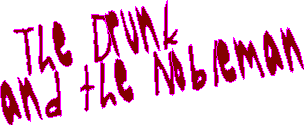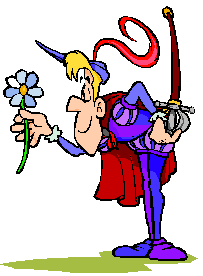

|
 |
or....Will the real me please stand upBack about two hundred years, deep in the Russia forests, long before the Russian revolution brought popular education to the masses, the population was divided into two groups. One group was the wealthy land owners, to whom the land belonged. The other group were the peasants who worked for the land owners. The land owners, or noblemen, as they preferred to be called were educated, not just in reading and writing, but in art and literature. They lived in large and well appointed mansions, which reflected their education, wealth and interest in the arts. The peasants were uneducated. They didn't know how to read or to write. They worked the land of the nobleman and in return received a percentage of the crops and the permission to live on the nobleman's property. Unlike the nobleman, the peasant pursued a more base pleasure to fulfill his life. The two lived separate lives, rarely mixing since the desires, pleasures and interests of each were worlds apart. One time a noble man was traveling by carriage through his lands, and spotted a peasant lying sprawled in a garbage heap. The nobleman stopped to investigate and found that the peasant was indeed very drunk and completely oblivious to the world. With a sense for humor, the nobleman instructed his attendants to take the man into his carriage and drive with him back to the nobleman's mansion. There the nobleman had his servants wash the man, shave him, dress him in the nobleman's finest silk pajamas and put him into the nobleman's own bed. After this was accomplished without the drunken peasant being aware of what had been done to him, the nobleman positioned himself by the window to have some enjoyment by seeing the poor peasant's reaction upon awaking. In a short time, the drunken peasant began to stir from his drunken slumber. What a surprise to find himself in such a beautiful room! The peasant blinked his eyes in amazement. Never had he seen such splendor. A room of such luxury he could never had dreamed of. Wall lined with the most exquisite wallpaper and decorated with beautiful oil paintings, majestically framed. Matching furnishings, an upholstered chair. The bed, soft and comfortable, with lined sheets and a down blanket, a stunning canopy , it was nothing like the crumbling shack where he spent his unfortunate existence. "I must be dreaming," he mumbled. "This can't be real. I must have drunken much too much last night." He pinched himself. "Ouch!" It hurt! "What kind of dream can this be? For sure this can't be real." The nobleman now instructed his servants to serve the poor peasant breakfast. The door to the room opened and a well dressed servant came in with a silver tray laden with food. "Is the master ready for breakfast?" the servant inquired. The unfortunate peasant was now doubly confounded. If being in this room was strange enough, who is this servant that is addressing him as "master"? The peasant thought his predicament through again. If I am really me, that is the peasant that good overly drunk last night, then this must be a dream. But is this is a dream, then this servant, who is he? The servant stood waiting for his "master's" answer. Finally the peasant turned to him and asked him to give him the food. "If this is a dream, then this won't be real food," he reasoned. The servant set the tray on the night table next to the bed, poured his "master" the tea, and uncovered the plate of food, an omelet, toast, fresh fish, cooked broccoli, (regarded as delicacy), and a pat of butter and a glass of orange juice. All this was served on the most expensive china and real silver silverware. The peasant thanked the servant and dismissed him. "This can't be real. I never saw food like this. It's really a dream. I'll try it and prove to myself that it isn't real" The peasant looked at the silverware. "This isn't real, I don't have such fancy things." Taking a bit of the food, he stopped, "I've never eaten anything near this good. But what am I doing here? Who am I? Am I the drunken peasant lying in the garbage heap or am I really the master of this beautiful house and estate?" The food was indeed delicious and nourishing. After the meal, he walked around the room. Spotting some books on the shelf, he had an idea. "It could very well be that this is my house and estate, after all, what am I doing here if it's not my room and house!? The servant himself called me 'master,' so I really must be the master of the house. And the food was real. But what is this in my head that tells me that I am a peasant, that I'm a drunk and that I fell asleep in a garbage heap. A-ha! It must be that THAT was a dream, and that I have finally awoken from my bad dream and I really belong here. To prove it, I will take a book off of 'my' bookshelf. If I am a peasant, I won't be able to read it. If I am a nobleman, and for certain, I am, then I will be able to read it.!" With certainty, he walked over to the book shelf and choose a large leather bound book and took it to the table. Sitting down, he opened it and began to read. The words were in the book, all the letters of the alphabet were there, but the confused man could not piece anything together to make even the simplest sense out of the letters. Closing the book, the man had to come to a decision. He could not read! The room and the food were real! But what is the real reality? Could it be that he is really the drunken peasant, and all that surrounds him is not his? "A-ha! I know!" he exclaimed, with a flash of inspiration. "All this is mine! I am really the wealthy land owner, and the reason I can't read these book is ..... because....no one can read books. Yes! Books aren't really read at all, they are just decorations!" And so the peasant came to a very nice conclusion to support and promote his own desires and delusions A funny story? It would be, if it were not so true. Our ability to delude ourselves into thinking that we are who we desire to be. Being in touch with reality and accepting it is a quality of honesty that is difficult to accept. We can see, our friends' faults and fallacies, but to see our own faults requires a desire for truth.
|
|
|
For More Jewish Reading, We Recommend The Jewish Magazine |
 |
Return to main page |